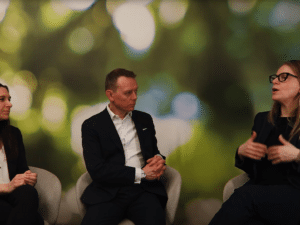Reward career paths: An interview with Annette Huiberts, Global Head of Reward at OCI Global
Alfredo Lira recently spoke to Annette Huiberts about her career in reward.
Can you briefly share your career journey and how you found your way into reward?
I’ve been in reward since 1999, starting in HR generalist roles first after university. My interest in reward was sparked during a project with Mercer, where I later joined and spent five years between Mercer and WTW. In 2003, a former colleague recruited me to Shell, where they allowed me to quickly dive into complex topics like annual reporting, and the comp side of restructuring.
Next, I spent 10 years as a self-employed consultant, covering all areas of reward — both the specialist areas as remuneration governance for the financial sector, executive compensation, share-based rewards, global mobility, as well as the routines of the annual comp cycle, reward policies and structures, job evaluation and more. For the past 5 years, I am back at the corporate life in global, end-responsible C&B roles. Since 2023, I’ve been with OCI, loving the combination of strategy and detailed execution that the role offers as well as the fast pace of the company.
When designing a reward strategy, what factors are most important to align it with both business goals and employee expectations?
I believe it’s essential to recognise that reward strategy doesn’t exist in isolation— it stems from broader company strategies. It’s crucial to start by understanding the organisation’s overall business strategy and mid-term plans. From there, the HR strategy is developed, which serves as the bridge between the business goals and employee expectations. The next level is your reward strategy.
Collaboration with both HR and business leadership is key to ensuring the reward strategy aligns with these objectives while also meeting the needs of employees.
How important are non-monetary rewards like flexibility, learning opportunities or recognition programs in today’s reward strategies?
In an ideal world, you have managed compensation and benefits in the company in such a way that it is no longer a concern of managers and employees, so that they can focus their energy and attention on the business. For this to happen, it needs to work seamlessly with other HR areas such as succession planning, training and development, and recruitment. Furthermore, non-monetary rewards, such as a managers giving recognition, definitely have more impact than financial rewards. For non-monetary rewards to truly work, this requires an open, non-hierarchical, encouraging, and safe company culture.
When a company struggles with non-monetary rewards, managers usually attempt to solve issues by throwing money at the problem (i.e. financial rewards). While this may offer a temporary solution, it’s not sustainable. As reward professionals, our role is to not only fix compensation but also support the dialogue by showing that compensation alone isn’t the solution. The focus should be on fostering strong management culture, teamwork, and long-term business success.
How has technology, including data and AI, shaped the way you design reward strategies?
AI is popular, but in reward, it’s more about using rules engines for job evaluations and tax laws rather than advanced AI. Data is essential, but the challenge lies in how companies use HR systems like Workday or SuccessFactors. Many consultants focus on offering truly flexible systems, aka selling as many consulting hours as possible. This often results in companies buying limited modules for cost reasons, which leads to struggles with incomplete data and functionalities that need to be bridged using a complex, hard-to-understand interface — often manually. Or the design and implementation drowns in the many options offered and the project never finishes. I’ve seen companies revert to Excel due to systems issues like these. If we would be able to shift the business model for consulting, and more ready-made, tried and tested, off the shelf solutions would be offered, we could fully harness data-driven solutions.
Also, AI, especially in rules-driven areas like taxation, has great potential to streamline reward processes. Yet, tax firms are still too dependent on revenues from hours of work to offer AI-based solutions based on rules engines which would take over the manual work of the many tax advisors they employ. But this will be a matter of time in my opinion.
How do you see AI and automation impacting the balance between human decision-making and algorithm-driven processes in reward management?
I see fairness as the most essential element of reward management. Reward, especially in areas like board and executive remuneration, has a highly subjective component with many specific aspects of individual cases and exceptions to consider. Even before AI, reward policies, which are nothing but rules engines on paper, guided these decisions. Now, those policies are being turned into automated rules engines. The benefit is that this can enhance fairness in decision-making by standardising processes and reducing bias. While human judgment remains important and should always be the last step, AI and automation offer a way to ensure that policies are applied consistently, reinforcing fairness across the board.
How has the current economic climate affected your reward strategies?
Early in my career, the economic climate was challenging, with 30% youth unemployment impacting reward strategies across the board. Today, the focus has shifted to attracting and retaining talent in a very tight labour market. While the economy may swing from one end to the other, the consistent factor remains developing a compelling reward strategy that not only attracts the right people but also keeps them engaged and delivering value.
For the next years to come, economic fluctuations aside, the labour market will remain constrained due to the longer-term demographic developments. While AI has the potential to alleviate some of these labour shortages in the future, we’re not there yet. For now, having effective and attractive reward policies is crucial to navigate these labour challenges and maintain a motivated workforce.
What do you think will be the most critical aspects of reward and compensation in attracting talent over the next 5-10 years?
Over the next 5-10 years, AI-based systems will be a major disruptor in reward and compensation. As these systems advance and potentially replace some HR functions, they could significantly impact how we manage and strategise compensation.
For example, in large, publicly listed companies, the number of compensation professionals — at the operational, regional, corporate, and global level — often is between 10 and 20 people in total. AI will facilitate the centralisation of the reward functions in one place via streamlining processes and data management. As a result, the need for such extensive teams, will be reduced. The same will happen in other support functions, reshaping how we approach talent attraction and management in these areas.
Looking ahead, what excites you the most about the future of reward management?
What excites me most about the future of reward management is the transition and impact of new, modern AI tools. I’m eager to see how these technologies will evolve and automate many aspects of my expertise. The prospect of integrating advanced AI to improve processes and enhance decision-making in reward management is particularly intriguing. It promises to transform the field, making it more efficient and data-driven while allowing professionals to focus on more strategic aspects of their roles.
About Annette Huiberts
Annette has held several senior roles at major companies, including Global Head of Reward at OCI Global and Head of Global Compensation & Benefits at Royal Vopak. She spent over four years at Shell, where she worked on international compensation and executive rewards. At Towers Perrin and Mercer, she focused on performance management, reward strategy, and employee benefits across global markets. While she also spent 16 years as a freelance consultant with 4elements, her primary focus has been on compensation leadership in large multinational corporations across various industries.





